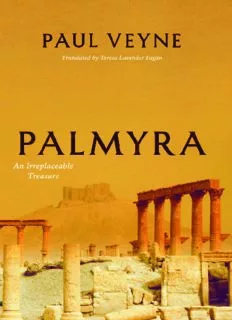
Palmyra: An Irreplaceable Treasure PDF
Preview Palmyra: An Irreplaceable Treasure
Palmyra Palmyra An Irreplaceable Treasure Originally published as Palmyre: L’irremplaçable trésor By Paul Veyne Translated from the French by Teresa Lavender Fagan The University of Chicago Press Chicago and London Publication of this book has been aided by a grant from the Neil Harris Endowment Fund, which honors the innovative Scholarship of Neil Harris, the Preston and Sterling Morton Professor Emeritus of History at the University of Chicago. The fund is supported by contributions from the students, colleagues, and friends of Neil Harris. The University of Chicago Press, Chicago 60637 The University of Chicago Press, Ltd., London © 2017 by The University of Chicago All rights reserved. No part of this book may be used or reproduced in any manner whatsoever without written permission, except in the case of brief quotations in critical articles and reviews. For more information, contact the University of Chicago Press, 1427 E. 60th St., Chicago, IL 60637. Published 2017 Printed in the United States of America Originally published as Palmyre: L’irremplaçable trésor. © Editions Albin Michel - Paris 2015 26 25 24 23 22 21 20 19 18 17 1 2 3 4 5 ISBN- 13: 978- 0- 226- 42782- 9 (cloth) ISBN- 13: 978- 0- 226- 45293- 7 (e- book) DOI: 10.7208/chicago/9780226452937.001.0001 Library of Congress Cataloging-in-Publication Data Names: Veyne, Paul, 1930–author. | Fagan, Teresa Lavender, translator. Title: Palmyra : an irreplaceable treasure / by Paul Veyne ; translated from the French by Teresa Lavender Fagan. Other titles: Palmyre. English Description: Chicago ; London : The University of Chicago Press, 2017. | Originally published as: Palmyre: l’irremplaçable trésor. | Includes bibliographical references. Identifiers: lccn 2016052000 | isbn 9780226427829 (cloth : alk. paper) | isbn 9780226452937 (e-book) Subjects: lcsh: Tadmur (Syria)—History. Classification: lcc ds99.p17 v4913 2017 | ddc 939.4/32—dc23 lc record available at https://lccn.loc.gov/2016052000 ♾ This paper meets the requirements of ANSI/NISO Z39.48- 1992 (Permanence of Paper). To Khaled al- Assad, archaeologist and head of antiquities for Palmyra from 1963 to 2003, assassinated for “being the director of idolatry” Contents Translator’s Note ix Introduction 1 1. Riches in the Desert 3 2. A Monumental Ancient City 7 3. Being a Capitalist Back Then 18 4. Antiquity in Antiquity 28 5. Palmyra: A Subject of the Caesars 31 6. A Syrian Tribe and a Hellenized City 34 7. Saving the Empire 38 8. The Palmyrene Saga 43 9. A Hybrid Identity 57 10. Dining with the Gods 66 11. Religion in Palmyra 69 12. Palmyrene Portraits 78 Conclusion 84 Notes 87 Translator’s Note As Paul Veyne says in the introduction to this wonderful little book, his intent is not to write a scholarly work on the ancient city of Palmyra. Rather, this book is a tribute to an unfathom- ably destroyed historical treasure. One can sense and share the author’s grief, his passion for Palmyra, its monuments, its people, its art. And as an impassioned tribute, the reader will find refer- ences to works without citations, perhaps passages that seem to arise straight from the author’s heart, prose that is closer to the realm of poetry than that of scholarship. Wherever pos- sible, I have provided additional information and footnotes to clarify a point, and have used published English transla- tions of passages from texts in other languages. As I write this note, Palmyra has been recaptured from ISIS, the group that was bent on her destruction. This is, of course, a very positive turn of events. And yet many of the ancient monuments and the irreplaceable art they contained, artifacts that brought the ancient city to life, are gone forever. And so we are all the more fortunate to have Paul Veyne’s work on this extraordinary city, its people, and its unique place in history. ix
Description: